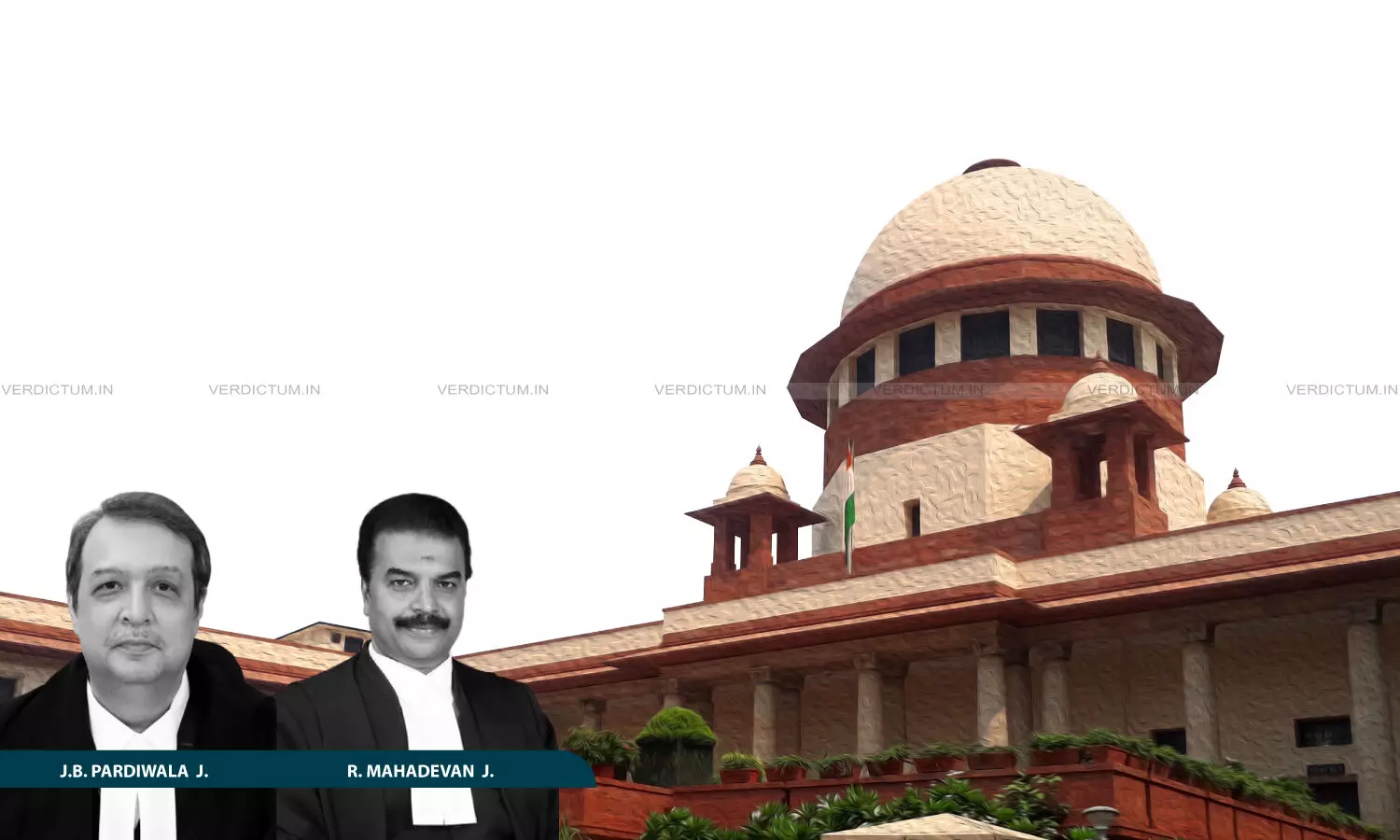
Justice J.B. Pardiwala, Justice R. Mahadevan, Supreme Court
“We Owed A Duty To Ourselves To Protect Rule Of Law": Supreme Court Recalls Its Order Against Allahabad High Court Judge
 |
|The Court withdrew its order restricting an Allahabad High Court judge from hearing criminal cases, stating it had acted to uphold institutional integrity and did not intend to lower the judge’s dignity, following a request from the Chief Justice of India
The Supreme Court today recalled two controversial directions it had issued in its August 4 order against a sitting judge of the Allahabad High Court, following a formal written request from the Chief Justice of India.
A Bench of Justice J.B. Pardiwala and Justice R. Mahadevan acknowledged the communication and stated that while the Court stands by its concern for institutional integrity, it would delete paragraphs 25 and 26 of the August 4 order “in deference” to the request from the Chief Justice of India.
The now-deleted directions had barred the judge from handling criminal matters and directed the Chief Justice of the High Court to place him on a Division Bench with a seasoned senior judge. The Bench clarified that these directions were issued due to recurring concerns over judicial conduct, stating, "The impugned order is not the only erroneous order of the concerned Judge that we have looked into for the first time. Many such erroneous orders have been looked into by us over a period of time.” (Para 27, August 4 order).
Reading out today's order in open court, Justice Pardiwala observed that the matter had been re-notified specifically to reconsider the directions in light of the Chief Justice of India’s request. The Court reiterated that its primary concern was not to cast aspersions on any individual but to uphold the dignity and authority of the judiciary. "At the outset, we must clarify that our intention was not to cause embarrassment or cast aspersions on the concerned judge. We would not even think of doing so. However, when matters cross the threshold and the dignity of the institution is imperiled, it becomes the constitutional responsibility of this court to intervene,” the Bench said.
Referring again to Para 27 of the original judgment, the Court stated that its earlier observations were made in the spirit of preserving institutional credibility. It emphasized that High Courts are not disconnected from the Supreme Court, stating: “The High Courts are not separate islands that can be disassociated from this institution. We reiterate that whatever we said in our order was to ensure that the dignity and authority of the judiciary as a whole is maintained high in the minds of the people of this country, as that will go a long way in reinforcing the faith that is reposed in us.”
The Court noted that the majority of Indian litigants never reach the Supreme Court and that the High Courts often serve as the final forum for justice: “For 90% of the litigants in this country, the High Court is the final court of justice. Only the remaining 10% can afford to approach the Supreme Court. The litigants who come to court expect the justice delivery system to function in accordance with law and not to obtain absurd or irrational orders.”
While withdrawing the directions, the Court emphasized that it continues to place its trust in the Chief Justice of the Allahabad High Court and clarified that the earlier directions were not intended to interfere with the High Court’s administrative powers: “We fully acknowledge that the Chief Justice of the High Court is the master of the roster. Our directions were absolutely not interfering with the administrative power of the Chief Justice.”
The Bench also made a broader observation regarding the state of judicial orders, citing a recent decision by a different Bench led by then Chief Justice of India Sanjiv Khanna and Justice Sanjay Kumar in Rika Dirani v. State of Uttar Pradesh, where costs of ₹50,000 were imposed on the state for filing criminal cases based on civil wrongs. The Court remarked, “We are being flooded with cases of civil wrongs being made the subject matter of criminal proceedings. We hope that in future, we may not have to come across such perverse and unjust orders from any High Court.”
Concluding the matter, the Court stated that it was “obliged” to reconsider the issue in view of the letter from the Chief Justice of India and emphasized that the judiciary must always work diligently and constitutionally. The order concluded with a direction to the Registry to forward a copy to the Chief Justice of the Allahabad High Court “at the earliest.”
On August 4, 2025, the Supreme Court strongly criticised a judgment by Justice Prashant Kumar of the Allahabad High Court for allowing criminal proceedings in a purely civil commercial dispute. The Bench expressed serious concern over the judge’s reasoning that civil recovery would take time, justifying a criminal case. The Court termed the reasoning “absurd and unpardonable,” and remarked, “We are at our wits’ end to understand what is wrong with the Indian Judiciary at the level of High Court.” The court directed that the concerned judge should not be assigned any criminal matters till retirement and must sit only in a Division Bench with a senior judge. The case, involving a commercial dispute over non-payment for goods, was remanded for fresh consideration before a different judge. The Court also noted that this was not the first erroneous order passed by the judge.
Cause Title: M/S Shikhar Chemicals v. State of Uttar Pradesh